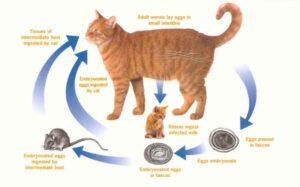Worms are internal parasites that can affect cats and dogs. They occur in a variety of organs, including lungs, heart, kidney and eye but mainly in the bowel. The most common worms are roundworms and tapeworms which live in the bowel. Although quite common, worms rarely cause serious disease. However, infected pets are a source of infection to other pets and people.
Roundworms
Ascarids, hookworms and whipworms are all types of roundworms.
Ascarid infections are extremely common and all puppies and kittens can be affected as their mothers can infect them in the womb, through their milk or saliva. Puppies and kittens with worms are generally unthrifty, pot bellied, have intermittent diarrhoea and possibly anaemia. Roundworms produce microscopic eggs which are shed in the faeces of infected pets and are a source of infection to other pets and humans. Pets can also be infected by eating an infected animal, such as a mouse or rat, which has eaten eggs. Roundworms are short, white and round bodied and are sometimes seen when passed by or vomited by infected puppies or kittens.
Hookworms
Hookworm infection occurs frequently during the summer, particularly in dogs confined to small areas of wet ground. The main signs of disease are anaemia, stunted growth, skin disease and weakness. Puppies are most severely affected and infection can occur in the womb or during nursing. Heavy infections also occur in cats and the main signs are recurrent diarrhoea, poor growth and a poor coat.
Whipworms
Whipworms infect dogs but in most cases the number of worms involved causes little apparent disease. However, severe infections are not uncommon, particularly in dogs up to 18 months old. The signs of infection are profuse diarrhoea, weight loss, lack of thrive and death. Whipworm infection in cats has not been reported in Ireland.
Tapeworm
Three types of tapeworm affect dogs and cats. The most common type occurs on flea infested pets that have swallowed a flea infected with a tapeworm cyst. The other types are picked up from eating raw flesh or meat from infected animals. Tapeworms are long, flat worms composed of many individual segments. They release mature segments containing eggs from the end of the worm into the faeces. These segments resemble grains of rice and are mobile. They can occasionally be seen on the hair around the anus or in the faeces.
Lungworm
Lungworm is a life threatening disease which appears to be on the increase. It can affect both dogs and cats. For pets to become infected they must eat infective larvae which may be present in slugs, snails and sometimes in frogs. Pets can also become infected by eating other animals which have eaten snails, such as rodents, frogs or birds. Some pets might not eat these creatures on purpose; they may do so by accident, e.g. when a slug or snail falls into a water bowl or is attached to a bone, treat or toy. They live in the small airways of the lungs. Infection is common, but signs of the disease are rare. The main signs are coughing, breathing difficulty and weight loss. You can read more about Lungworm in our Lungworm blog.
Diagnosis
Laboratory examination of pet’s stool is the best way of determining if and what type of worms it has, although tapeworm eggs are rarely found in the stool.
Treatment
Once your pet has been diagnosed as having worms, an appropriate treatment should be given. Otherwise, all pets should be treated for worms every 3 months with an effective treatment at the correct dosage. Many over-the-counter and pet shop worm treatments are not effective. As most treatment is given on a weigh basis, it is helpful to know your pet’s weight before treatment.
It is important to treat puppies and kittens for worms, especially roundworms, from an early age and repeated regularly. Puppies and kittens should be wormed with an effective treatment every 3 weeks from 4 weeks of age until they reach 6 months of age. When treating for tapeworm, it is also important to properly treat for fleas.
Public Health
To reduce the possibility of human infection with worms, pet owners should worm their pets regularly and make sure that dogs in particular do not soil on public areas. If this should happen, the onus is on you, the owner, to remove and dispose of it safely.



